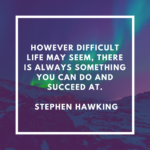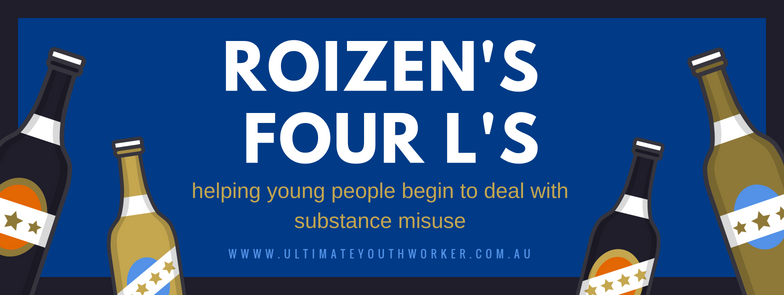Roizen’s 4L’s
We all know that substance abuse is on the rise in adolescents the world over. It is often in the top five biggest issues for young people in surveys and is on the agenda in almost every youth service I know. Many of the young people I have worked with have either misused substances themselves or know someone who does. Drugs and alcohol are one of the problems that young people face which youth workers need to have a good understanding about. In coming posts we will speak more about the AOD sector however in this post we will give you a tool to use when one of your young people has more than a passing relationship with substances.
Whether you are a believer in zero tolerance or a staunch observer of harm minimisation, working with young people who use drugs and alcohol excessively can be difficult. We can have many ideas on what to talk to them about or why they are using but if they do not see their use as problematic it is unlikely that they will do anything about it. What we need is a system to help young people see their behaviour as problematic in a way that will not strain our relationship too much.
 Enter Ron Roizen
Enter Ron Roizen
Ron Roizen, an American sociologist, created a useful shorthand system for the harms which may be experienced through a use of drugs. Support workers have been using this system for decades to help young people move from pre-contemplation to contemplation. The system is known as Roizens four L’s. Each word begins with the letter L – ‘Lover’, ‘Liver’, ‘Lifestyle’ and ‘Law’ – stands for a category of harm.
 Lover
Lover
Lover helps us to discuss the problems which have arisen with relationships in a young persons life. These problems may show their head with family and/or friends, boyfriends, girlfriends or even their significant goat. Lover reminds us to probe how substance use has changed their relationships with those who are significant in their lives.
 Liver
Liver
Liver implies all the physical and psychological health problems caused by drug use, such as cirrhosis, depression, anxiety and psychosis. When speaking to young people we use the word LIVER to remind ourselves to use probing questions into the health implications of their substance use.
 Lifestyle
Lifestyle
Refers to problems of employment, problems with study, financial problems and other problems which have taken place due to their substance use and its change to their social behaviour. Did they formerly play sport on the weekend which now is left behind for a score? Perhaps it is that they are now night owls and miss work for sleep. Use the word LIFESTYLE to remind yourself to ask questions about how their substance use has changed their lifestyle.
 Law
Law
LAW refers to all the legal problems which may result from drug use. Issues with the fuzz, the plod, the cops or judge dread. How has their behaviour brought them into the realm over the law. How much are you carrying of what? What is the sentence for that? I see you were placed in custody last night! LAW reminds us of the legal implications of a young persons substance use.
Using your skills in basic human interaction and relationship building spend time fleshing these out. Ask questions. Probe answers. The purpose of this exercise is not to get the young person to stop using drugs but to recognise that their use has had negative effects on them and their lifestyle. Remember with people slow is fast. If you push too hard too fast you will alienate them and lose your relational trump cards.
Use Roizen’s 4L’s to get them thinking. We will deal with what to do next…next week.
If you haven’t yet, sign up for our newsletter to hear all the goings on at Ultimate Youth Worker.
[button_1 text=”Subscribe” text_size=”32″ text_color=”#ffffff” text_bold=”Y” text_letter_spacing=”0″ subtext_panel=”N” text_shadow_panel=”Y” text_shadow_vertical=”1″ text_shadow_horizontal=”0″ text_shadow_color=”#ffffff” text_shadow_blur=”0″ styling_width=”40″ styling_height=”30″ styling_border_color=”#9e5424″ styling_border_size=”1″ styling_border_radius=”6″ styling_border_opacity=”100″ styling_gradient=”Y” styling_gradient_start_color=”#1e305e” styling_gradient_end_color=”#1e305e” drop_shadow_panel=”Y” drop_shadow_vertical=”1″ drop_shadow_horizontal=”0″ drop_shadow_blur=”1″ drop_shadow_spread=”0″ drop_shadow_color=”#000000″ drop_shadow_opacity=”50″ inset_shadow_panel=”Y” inset_shadow_vertical=”0″ inset_shadow_horizontal=”0″ inset_shadow_blur=”0″ inset_shadow_spread=”1″ inset_shadow_color=”#1e305e” inset_shadow_opacity=”50″ align=”center” href=”http://eepurl.com/llk7r” new_window=”Y”/]
